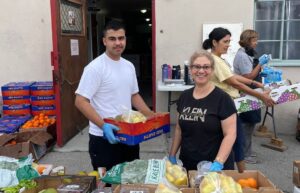 St. Stephen’s, Hollywood, is one of eight recipients of a recent creation care grant through The Episcopal Church’s Task Force on the Care of Creation and Environmental Racism.
St. Stephen’s, Hollywood, is one of eight recipients of a recent creation care grant through The Episcopal Church’s Task Force on the Care of Creation and Environmental Racism.
St. Stephens was awarded $15,000 for it’s “community nutrition” project, a recent initiative among the several food and environmental justice projects at St. Stephen’s.
The grant will focus on the Hollywood parish’s project of dehydrating extra produce from the food distributions at St. Stephen’s and St. Barnabas, Eagle Rock.
There are multiple motivations to dehydrate leftover produce, said the Rev. Canon Jamie Edwards-Acton, rector at St. Stephen’s and priest-in-charge at St. Barnabas. First, it will keep leftover produce from the landfill by dramatically extending the shelf life. Dehydrated produce is almost as healthy as fresh produce, Edwards-Action said, and dehydrated food could be a good way to get healthy food to unhoused people.Produce distributions aren’t very effective for the unhoused, Edwards-Action said, because much of the food needs to be prepared in a kitchen.
St. Stephen’s has been working on the dehydration project for some time, and will use the grant money to scale up the operation, and test out its long-term feasibility.
Edwards-Acton said that once the project is running at a large enough scale, he would like to give out the dehydrated goods at weekly produce distributions, distribute them to the unhoused, and sell them to generate revenue, as well as developing branding and packaging.
While fruits such as apples most readily come to mind as dehydration-candidates, Edwards-Acton said, “We dehydrate all kinds of stuff. You’d be surprised what ends up being good. My biggest surprise, what I thought was the tastiest dehydrated, was cantaloupe. It reminds me of a nutritious version of those fruit roll ups.” In addition to fruit, Edwards-Acton plans for the project to dehydrate potatoes, carrots, and other vegetables to make soup mixes, and potentially bring on staff to develop recipes for the mixes.
The most significant change to the project with the new money will be increased staffing, Edwards-Acton said. Currently, people are working the dehydrators three days a week, he said, but he hopes to increase that. Edwards-Acton said that $15,000 won’t pay to staff the project very long, but it will help with a trial period, to understand the efficacy of the project. “We can test things out,” he said. “We can see ‘is this really scalable?'”
By summer, Edwards-Acton said he hopes to be producing between 300 and 500 packages of dehydrated food per week, first focusing on supplying the weekly produce distributions at St. Stephen’s and St. Barnabas, as well as having more developed packaging, branding, and community awareness, perhaps including a social media campaign.
“I think I’m always a little more optimistic than what reality plays out,” Edwards-Acton said. “But there’s so much going on.”
Anyone interested in volunteering with St. Stephen’s or St. Barnabas can contact Edwards-Acton at hopeinhollywood@gmail.com, or check the L.A.works website, where the parishes regularly post volunteer opportunities.
